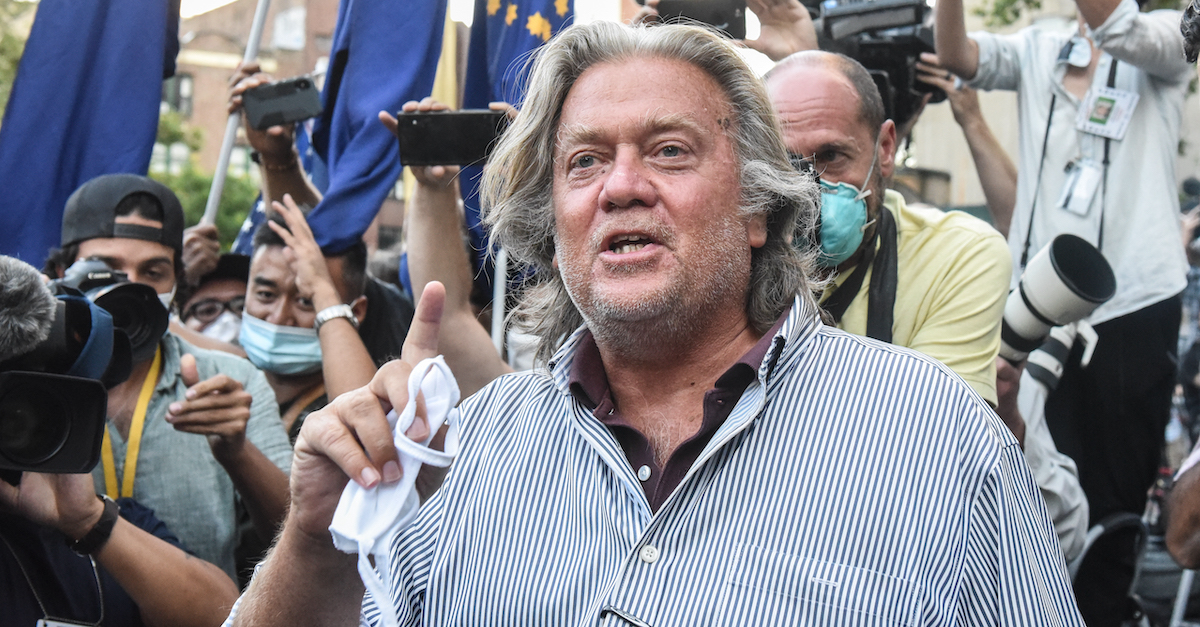
Former White House strategist Steve Bannon got what he asked for—and then some.
The hard-right media mogul turned Donald Trump campaign and administration operative prevailed on Tuesday in successfully dismissing his indictment based on the 45th president’s pardon during the waning days of his administration.
Federal prosecutors asked a federal judge to administratively close the case, a distinction that left legal observers wondering why the government found that distinction important.
On Tuesday, U.S. District Judge Analisa Torres ruled in Bannon’s favor, finding the government’s precedent for the maneuver unavailing.
“Moreover, the majority of courts, when faced with such a decision, have chosen to dismiss an indictment, particularly when a defendant has moved for dismissal,” she wrote. “The Court concludes, therefore, that the pardon is valid, and that dismissal of the Indictment is the proper course.”
Before ending her ruling, Torres extensively cited case law suggesting Bannon’s acceptance of the pardon acknowledged the truth behind allegations that he conspired to defraud donors of the non-profit We Build the Wall and pocketing the loot through money laundering.
“Of course, ‘a pardon does not, standing alone, render [a defendant] innocent of the alleged… violation,'” the judge’s ruling notes. “Nor does a pardon before conviction ‘blot out probable cause of guilt or expunge an indictment.’ […] To the contrary, from the country’s earliest days, courts, including the Supreme Court, have acknowledged that even if there is no formal admission of guilt, the issuance of a pardon may ‘carr[y] an imputation of guilt; acceptance a confession of it.'”
That premise of that famous quote, from the Supreme Court case of Burdick v. United States, has been questioned by some legal experts who argue the other function of the president’s pardon power to hold a check on prosecutorial power.
Some legal experts interpreted the government’s maneuver in Bannon’s case as a check on abuse of the president’s pardon power.
Judge Torres, however, made clear that the pardon’s imputation of guilt has been recognized in several other cases.
“For instance, in 1833, Chief Justice John Marshall wrote that, ‘[a] pardon is an act of grace, proceeding from the power intrusted with the execution of the laws, which exempts the individual on whom it is bestowed, from the punishment the law inflicts for a crime he has committed,'” the ruling notes.
Quoting another 19th century ruling from the New Jersey Supreme Court, Torres wrote: “Pardon implies guilt.”
If there be no guilt, there is no ground for forgiveness. It is an appeal to executive clemency. It is asked as a matter of favor to the guilty. It is granted not of right but of grace. A party is acquitted on the ground of innocence; he is pardoned through favor. And upon this very ground it is that the pardoning power is never vested in a judge.
For Torres, this understanding is a living history.
“This venerable principle remains true in the twenty-first century,” she wrote.
Bannon’s lawyer Robert Costello did not immediately respond to a request for comment.
Listen to analysis of Bannon’s pardon on Law&Crime’s “Objections” podcast:
Read the judge’s ruling below: